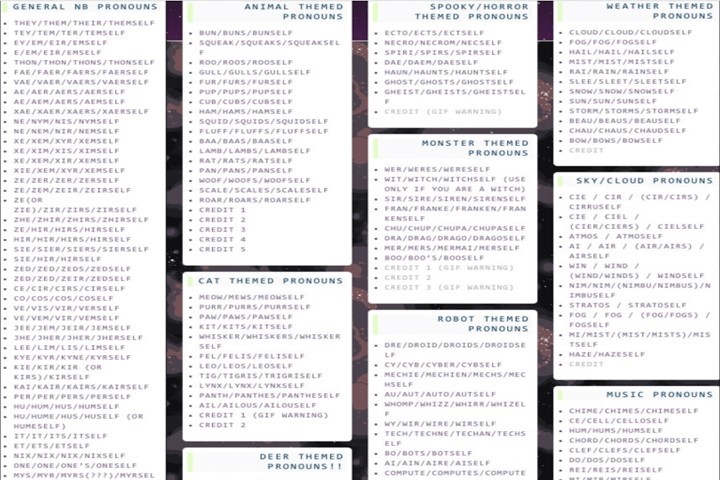If you want to know what happens when you don’t learn after age two that the world doesn’t completely revolve around you, look no further than “neopronouns.” These are “personal” pronouns an individual chooses to express his “identity.” But don’t think this simply means an opposite-sex identity. That’s antiquated thinking — right out of 2019.
Rather, the New York Times provides a guide on the matter and asks, “Are you a person, place or thing?” before presenting neopronoun examples such as “bun/bunself,” “kitten/kittenself,” and “prin/cess/princesself.” Mine, at least right now, is besidemyself.
In case you think my current neopronoun is actually BabylonBeeself, know that this is a real story. As commentator Andrea Widburg explains, “A few years ago, we all used to laugh at the creative pronouns that so-called ‘non-binary’ people concocted to avoid both human biology and the traditional He/Him or She/Her pronouns. They pluralized themselves (‘My pronouns are They/Them’) or substituted silly consonants in place of actual letters (‘My pronouns are Ze/Zir or Xe/Xir’).”
“Now, though, little things like ‘Ze went to the store’ or ‘Give xir the milk’ seem sweetly old-fashioned,” Widburgself continues. As the Times tells us, no doubt with a straight face to balance its crooked thinking:
A neopronoun can be a word created to serve as pronoun without expressing gender, like “ze” and “zir.”
A neopronoun can also be a so-called “noun-self pronoun,” in which a pre-existing word is drafted into use as a pronoun. Noun-self pronouns can refer to animals — so your pronouns can be “bun/bunself” and “kitten/kittenself.” Others refer to fantasy characters — “vamp/vampself,” “prin/cess/princesself,” “fae/faer/faeself” — or even just common slang, like “Innit/Innits/Innitself.”
The chart below provides a comprehensive list of neopronoun possibilities.

The Times also presents some neopronoun adherents and their reasoning, if you can call it that. For example, one young Twitter user who describes himself as “neurodivergent,” wrote, “I tend to perceive how a word makes me feel rather than just seeing the word,” the paper relates. “I chose my bink/bonk pronouns because they remind me of clowns. Clowns and harlequin dolls make me very happy.”
Yet since there’s pressure to use someone’s preferred pronouns, we may ask: What about people bedeviled by that not uncommon fear of clowns? What about poor hateBozoself?
Quoting another neopronoun user, the Times also writes, “I chose the ones I use as I feel a connection to them, EG vamp/vamp pronouns — I feel a connection to vampires and that in a way feels connected to my gender.” Sounds like my last lawyer.
While this is comical, it’s far from a joke to some people. “Many neopronoun users are dead serious, and are also part of online communities that are quick to react swiftly to offenses,” the Times further reports. “They are deeply versed in the style and mores of contemporary identity politics conversations.”
“Neopronoun users may publish strict boundaries and preferences around behaviors, enthusiasms and hatreds,” the Times later tells us. “Many of them have defined lists of behaviors they find unacceptable around privacy or cruelty — sometimes referred to as ‘DNI’ lists, short for ‘do not interact.’”
In other words, these people are quick to attack traditional standards and values with the notions that “Anything goes” and “Who’s to judge?” But then they erect their own stringent boundaries and become quite judgmental.
Only four percent of sexual-devolutionary (“LGBT”) young people currently use neopronouns. But give it time. Twenty-five percent already use “non-binary” ones, with the quoted term reflecting the fiction that sex exists on a spectrum.
As to this phenomenon’s cause, Widburg writes that this “is what happens when people become so extraordinarily self-centered that they believe that the entire English language revolves around them.” It’s true, too, that many modern parents pander to their children to the point of treating them as little princes and princesses (ergo “princeself”?).
Moreover, we’ve long been stoking children’s pridefulness in the name of self-esteem training, with “self-esteem” having become a euphemism for pride — a deadly sin.
Yet what’s also apparent is that these neopronoun types are lost souls. Coming to mind here again is Belgian poet Émile Cammaerts’s observation (I’m paraphrasing), “When people cease believing in God, it’s not that they start to believe in nothing. It’s that they’ll believe in anything.”
Not believing in God and, correlating with this, also not believing in Truth (absolute by definition), the people in question are relativists. And as I always point out, the result of concluding everything is relative is often to make everything relative to oneself — and then to be quite absolutist about it.
This is the process of self-deification, and godself can even have his own “morality.” And, hey, compared to that, having your own language standards is small potatoesself.



